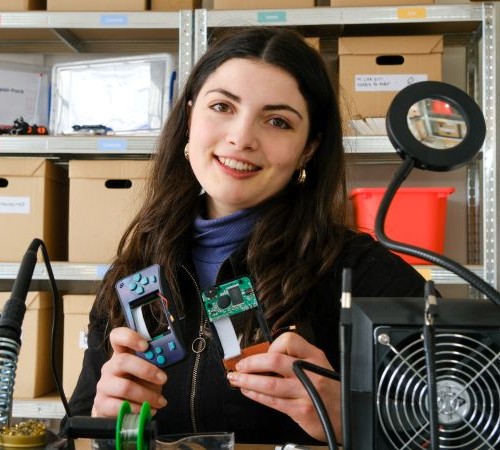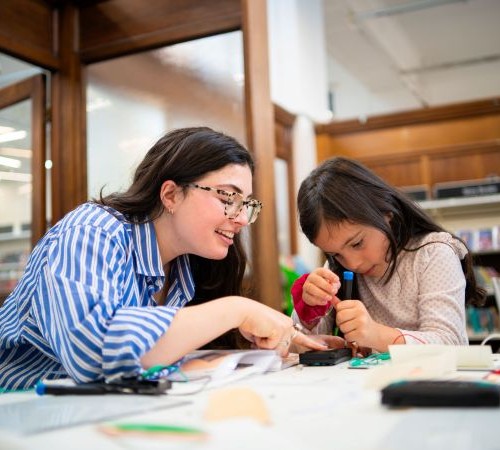Fixing the future
Growing up, Megan loved taking broken things apart, figuring out the science behind how they work, and fixing them. Diagnosed with dyslexia and dyspraxia, she says she preferred practical work at school and would tell people she wanted to be an inventor. But when a female engineer visited her school to give a talk, Megan realised what she actually wanted to be was an engineer. “I got home that evening, found the design engineering degree at Imperial College and told my parents, ‘I’m going to go to this university and study this degree and be an engineer,’” she says.
At Imperial College, Megan was part of the Mums & Dad scheme, which matches up first year students with returning undergraduates on the same course. “My ‘mum’ was in the ELS cohort above me and encouraged me to apply,” she says. “I wasn’t sure if it was for me at first, so I left it until the day of the deadline but decided to give it a go."

Resolving the electronic waste crisis
Megan says that the interview process ended up being one of the most impactful parts of her ELS experience. “I had always said that I wanted to start my own business,” she says. “My interviewer, Catriona Schmolke, asked me ‘Why don’t you just do it?’ It gave me the confidence I needed and got me to think about what was holding me back.”
Megan’s business idea came about during an entrepreneur module in her final year of university. “I had studied the UN’s 17 Sustainable Development Goals and felt inspired to find away to help resolve the world’s electronic waste crisis. Around 60 million tonnes of electronics are being thrown away globally every year,” she says.
Team repair
Through a subscription service, Team Repair teaches children science by giving them the tools and confidence to take apart a broken electronic product, diagnose the issue with it and then repair it themselves, either at home or at school. “Our goal with this business is to help solve two problems – the UK’s STEM skill shortage and the e-waste crisis,” Megan says.
Megan used her ELS funding to help get Team Repair off the ground. She did courses on startups and sustainability, bought equipment to record video pitches and used the funding to help with international pitches.
“The ELS was the catalyst for me starting my own business,” Megan says. “As well as the funding, it gave me resources and a network I wouldn’t have had without it. I got to meet people who were already doing amazing things outside of their degree and I found that inspiring."
The ELS was the catalyst for me starting my own business.

Award-winning
In 2022, while Megan was still at university, Team Repair won the Mayor of London’s Entrepreneur Award. “We were pitching for the Mayor’s award in the same week I was finishing my Master’s – it was a very stressful week! My degree ended up feeling like a side project, but the award really turned our idea into a business.”
Since then, Team Repair has won numerous awards and competitions, including the Innovate UK Unlocking Potential Award and the Santander X Global Challenge. Megan was named on the WISE100 2024 list, awarded as an inspirational woman in STEM at the House of Lords, and won the Innovate UK Young Innovator award.
“We have reached 12,000 children and young people so far, from all different abilities and backgrounds,” Megan says. “We are focused on the UK at the moment, but have plans to take Team Repair international. “I want to see a world where everyone has the confidence to repair.”
Interested in participating in the Engineering Leaders Scholarship?
Visit the programme pages to find out more about how it could benefit you and your career.
